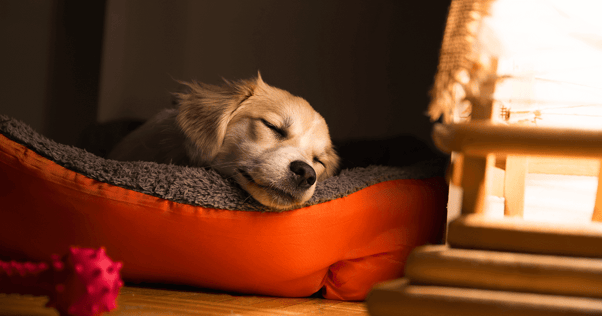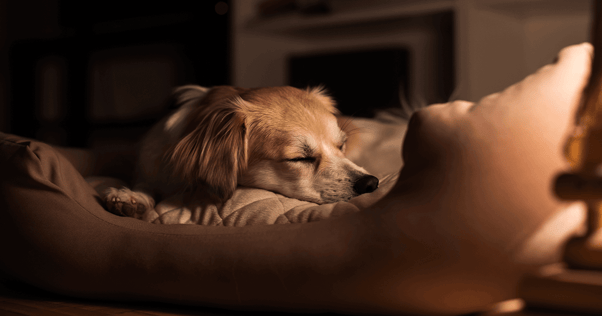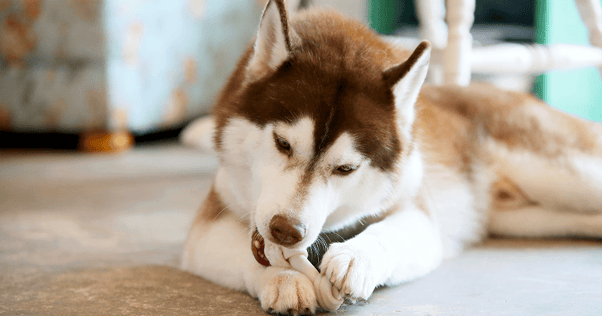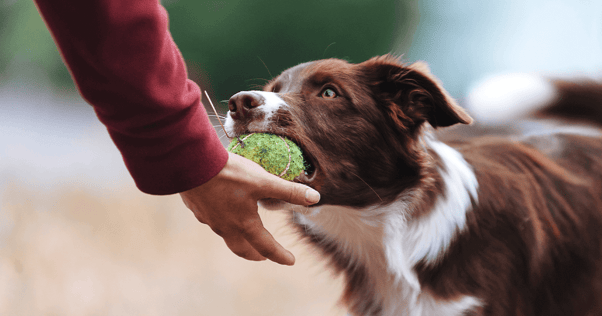Why is My Dog Anxious At Night? A Pooch’s Point of View
Although I have the best cozy bed a dog could wish for, there have been times when I just can’t settle to sleep at night!
Sleep is so important for me though. According to a study; “Sleep… is a vital behaviour in all mammals, including dogs. The primary function of sleep is often debated. However, learning and memory consolidation, as well as maintenance of the immune system appear to be consistently important. In addition, changes in animal sleep behaviour… may be indicative of animals’ ability to cope with their environment or changes in environment.”
Clearly, sleep is very important to help me stay healthy and cope better with everyday life!
Many experts also think that lack of sleep may contribute to a dog being in a bad mood, which does not make for a nice pooch!
Anxiety is one reason for a dog not sleeping at night, and there are many things that can make a dog anxious. These can vary from young puppies, to adult dogs, and through to senior pooches.
Let me try to explain.
Signs that your dog is anxious at night
If only I could speak human! But sadly, we dogs are unable to tell you verbally how we are feeling. So we need you need to look out for signs that we are feeling anxious.
There are obvious signs, like howling or barking overnight; or you may hear us pacing around and not being able to settle.
Some of my doggie friends resort to chewing things around the home or even self harming, like excessive licking – creating bare patches on our coat. You may even find puddles on the floor every morning.
I understand that it can make pet parents very unhappy if their sleep is disturbed at night, but if you work out the reasons, you can probably help them.

Why puppies get anxious at night
A new puppy needs time to adjust to a new environment. So if we’ve just arrived, please be patient with us for a while until we settle in.
Remember that your new puppy may be feeling lonely. We are used to sleeping in a cozy bundle with our siblings, so coming into a new home can be stressful for us! We might be missing the comfort and warmth of our littermates.
To help us settle in, introduce us to our new bed when we arrive home, and make sure there are some comforting smells nearby - like an old t-shirt or sweater piece of material that our mother has slept on before you brought us home. It’s important to make sure we are warm and cozy - and it helps to have some toys nearby!
When we are puppies, we have a lot of energy that we need to use up before we can sleep! So make sure to walk us or play games with us early in the evening. That way we can relax easier - as long as you are careful not to over-excite us!
Puppies also have very poor bladder control, and will need to urinate every few hours. If your pup is already trained to wee outside, they could get anxious if they don’t have access to go outside. So in the first few weeks, you should be prepared for disturbed nights to let us out when we need to! Pups will get better at bladder control as they get older, and with the right training! For older dogs, we should be able to make it through the night, but it’s always wise to let us outside for a toilet break just before we settle to sleep.
My pet parents used ADAPTIL Junior when they first adopted me. It really helped me to adapt to my new home – I didn’t cry at night and it supported me when I was staying home alone and when I had to travel in the car.
Why adult dogs get anxious at night
Like humans, we adult dogs can still get a little nervous sometimes! Don’t forget, we have very sensitive hearing and if something unexpected happens, like loud noises, it can make us concerned. I certainly don’t like nights when there are fireworks, but my pet parents do everything they can to make me feel calmer when it’s time for firework celebrations.
For the best night, we like to follow our usual routine. If anything unusual happens overnight, like an alarm going off, new guests in the house, or someone shouting outside, it can make us unsettled because it’s not the norm.
We might also get anxious if our pet parents are away overnight, or we are sleeping somewhere other than our own home. I believe this is called ‘separation anxiety’.
A further thing to keep in mind if we’re struggling to settle, is to be careful in checking us for any sign of injuries, as these can disturb us at night if we are in pain.
Why senior dogs get anxious at night
I have a doggie friend called Lola. She is a beautiful Boxer but she has some joint issues that she struggles with at night and sometimes she gets very anxious if she cannot turn around easily in bed.
She also finds it difficult to walk on slippery floors. I think she feels very insecure, but her pet parents have helped by putting lots of non-slip mats around to help her feel safe.
I’ve also heard that some older dogs suffer from cognitive dysfunction syndrome, which is also known as dog dementia. This means they may get confused and restless at night and they may pace around and are unable to fall asleep. Medication can often help to slow the progression of dementia. The vet gave my friend Lola some medication to help her, and she does not seem to have gotten any worse lately!
How to help your dog be less anxious at night
It could take a while to work out the best solution to help your dog be less anxious at night, but here are a few tips:
- Try ADAPTIL. My pet parents have an ADAPTIL Calm Diffuser plugged into the room where I spend most of my time, and where I settle to sleep, which reassures me!
- Develop a daily routine that includes a calm wind-down at bedtime. I have learned that whenever my pet parents settle on the sofa and have a late night hot chocolate, it will soon be time to go out for a wee, then hop into bed!
- Take time to help your pooch adjust to any changes in the home, like the arrival of a new baby, a new routine, or perhaps a new job that takes you away from the house all day. The change may have unsettled us!
- Work out what sort of bed your pooch prefers. This may take a little trial and error. Do they like to flop out on a large cushion, or do they like to snuggle up on a nest bed? Perhaps have a go at making a bespoke bed, just for your special friend.
- If your pooch has sore joints, why not put a hot water bottle under some blankets to help them relax. Make sure it’s not too hot though!
- Try leaving some calm music playing - it can help us relax and mask any sounds that might disturb us.
- I go out for a walk in the early evening with my pet parents, and that gives me enough physical and mental exercise to help me relax.
- Be patient if your dog wants to go to the toilet in the middle of the night, but avoid any interaction or fuss that may encourage us to do it every night.
- Don’t punish your pooch for disturbing you during the night – this could make the situation worse and make them more anxious!
- If your dog continues to be anxious at night, you should have them checked by your vet to rule out any underlying medical issues. A qualified animal behaviourist may be able to help pinpoint the underlying issues, and develop a management plan to help us settle better during the night.
Woof! Now I’m ready for a long night’s sleep!

Related posts
Leave A Comment
Want to sign up for our blog?
Information Notice
The personal information collected is intended for Ceva Santé Animale, and Ceva group companies, in order to manage your request.This information may be passed on to service providers in order to organize this management. In accordance with the Regulations on personal data you have rights of access, rectification and limitation of processing of your data. You may also, in certain limited cases, oppose the treatment, withdraw your consent and request the deletion and portability of your data. For any request relating to your personal data please go to this page

